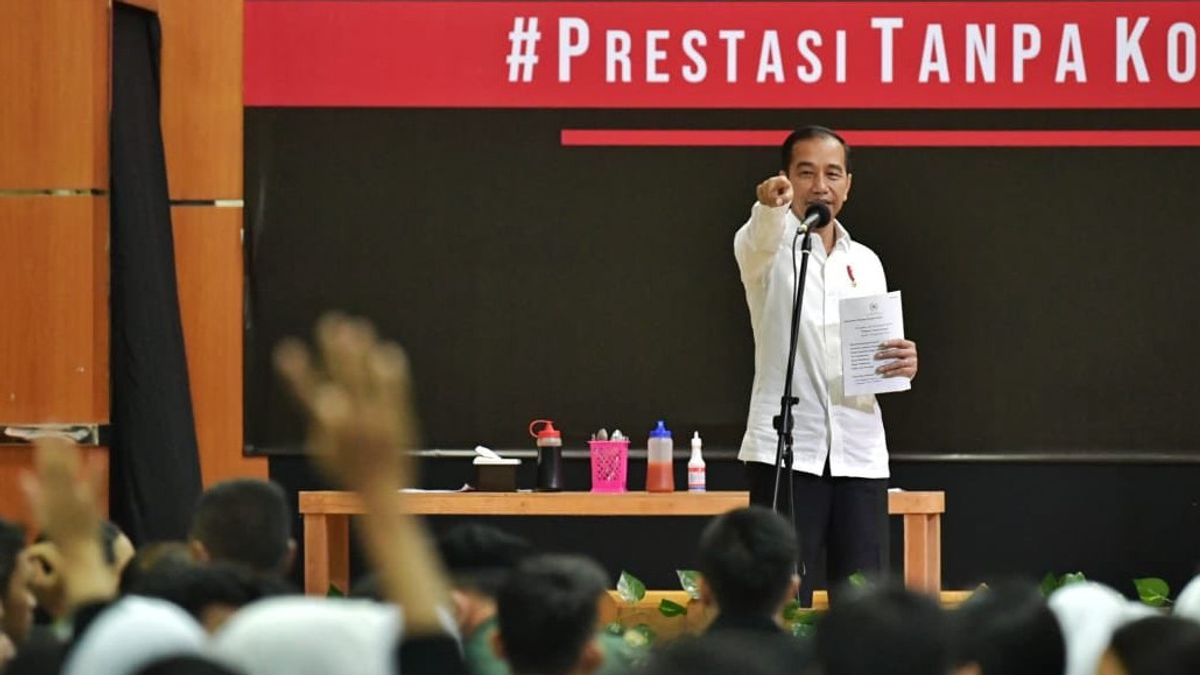JAKARTA - On World Anti-Corruption Day 2019, President Joko Widodo said the death penalty could be imposed on perpetrators of corruption or corruption. However, Jokowi's statement is considered ambiguous.
Because, when Jokowi said the death penalty for corruptors could be applied, some time ago he actually granted clemency for corrupt officials such as former Riau Governor Annas Maamun who was a convict in a bribery case related to forest conversion.
An assessment of Jokowi's ambiguous attitude was conveyed by a criminal law expert from Trisakti University, Abdul Fickar Hadjar. He said that Jokowi's attitude with what he said about the punishment for corruptors was different.
"Yes, this is ambiguous or ambivalent. The direction is not clear," said Fickar when contacted by VOI via text message, Tuesday, December 10.
He considered that this ambiguous attitude was also reflected in the previous decisions made by Jokowi. Including, about his commitment to eradicating corruption. "Perhaps, (Jokowi's) commitment to eradicating corruption is the same. The proof is that Pak Jokowi agrees that the KPK Law is revised and the KPK is weakened," he said.
Some time ago, President Jokowi was highlighted due to his decision to grant clemency to Annas Maamun, who was convicted of receiving bribes for land conversion in Riau.
This clemency is stipulated in Presidential Decree number 23 / G of 2019 since last October 25. After the decision was signed, Annas received a one-year discount from the total sentence of 7 years.
#SahabatDikbud, President of the Republic of Indonesia @jokowi attended the #PrestasiTanpaKorupsi stage in commemoration of World Anti-Corruption Day 2019 at SMK Negeri 57, Pasar Minggu, Jakarta, Monday (9/12). # Hakordia2019 pic.twitter.com/s5t5GXXR05
- Ministry of Education and Culture (@Kemdikbud_RI) December 9, 2019
The reasons for giving clemency were made by Jokowi for humanitarian reasons, namely Annas's health condition and age. It is known that while serving a criminal sentence at Sukamiskin Prison, Bandung, West Java, the former governor suffered from various diseases such as POPK (acute COPD), dysepsia syndrome (depression), gastritis (stomach), hernia, and shortness of breath so he needed to use oxygen all the time. .
"Indeed, from a humanitarian point of view, his age is also old and sickly. So that from a humanitarian perspective it is given," Jokowi told reporters at the Bogor Presidential Palace Complex, West Java, Wednesday, November 27.
Not long after the clemency was granted, Jokowi said that the death penalty could be imposed. Provided, Law Number 20 Year 2001 concerning Amendments to Law Number 30 Year 1999 concerning Corruption Eradication is revised by members of the Indonesian Parliament. It's just that this revision must of course be with the blessing of the people.
"If people wish to do so in the draft of the Corruption Crime Law (death penalty) it is included," said Jokowi at SMKN 57, Jakarta, Monday, December 9, adding that this wish must also be owned by members of the council as legislative parties.
Is it true that the death penalty is effective?
The discourse on the death penalty for corruptors actually already exists in Article 2 paragraph 2 of Law 31 of 1999 concerning Corruption Crimes. This punishment is part of Article 2 paragraph 1 which regulates the act of enriching oneself and others that can harm state finances.
"In the event that the criminal act of corruption as referred to in paragraph (1) is committed under certain circumstances, the death penalty may be imposed," reads Article 2 paragraph 2.
"What is meant by 'certain circumstances' in this provision is meant as a deterrent to the perpetrator of the criminal act of corruption if the criminal act is committed when the state is in a state of danger in accordance with the applicable law, at the time of a national natural disaster, as a repetition of the criminal act of corruption. , or when the country is in a state of economic and monetary crisis, "reads the explanation of Article 2 paragraph 2.
Even though there are so many corruption cases in Indonesia, so far there has been no corruption case where the suspect has been sentenced to death. There was only a life sentence received by former Chief Justice of the Constitutional Court (MK) Akil Mochtar in 2014. At that time, Akil was proven to have accepted bribes related to four out of five election disputes.
It's just that, even though there is a death penalty law for corruptors in certain circumstances, Fickar again talks about the effectiveness of the sentence. For him, the death penalty will not immediately provide a deterrent effect. He took the death penalty for a drug kingpin as an example.
"The death penalty will not be effective for deterrence. The proof is that the death penalty for drugs (kingpin) does not dampen the perpetrators," he said.
This criminal law expert said, rather than the death penalty, it would be better if these corruptors were impoverished. Apart from asset recovery, it turns out that impoverishing corruptors also has a more deterrent effect. This is done by blocking their financial access, such as not allowing corrupt convicts to own companies, not being allowed to become company leaders, and depriving them of political rights.
"This will provide a more deterrent effect for them than the death penalty," said Fickar.
Not only Fickar, Indonesia Corruption Watch (ICW) researcher Tama S Langkun also emphasized that the death penalty is not very effective. He said that China, which imposed the death penalty for corruptors, has now dropped its Corruption Perception Index (IPK).
According to Tama, the results of a survey by Transparency International Indonesia (TII) in 2018 said that China's IPK was in position 87 and had dropped to 10 rankings in the previous year.
"This means that the death penalty is not as effective as we imagined. So in my imagination, how can corruptors not be sentenced to death but how the sanctions are heavier and we are no longer permissive," said Tama in Jakarta, Monday, December 9.
This anti-corruption activist said there are several more effective ways to provide a deterrent effect on corruptors. First, about the position of the KPK which should be strengthened. Second, the imposition of heavier sanctions and the maximum efforts to recover assets.
"The impoverishment we imagine is that the people who are being punished must really recover the state's losses. How do you do it? Yes, the assets were taken," said Tama.
"He returned it and that was what became heavy, 'wow, this is really hard as a result of corruption'. It's not like that, right now, it's only been five years, two years and three months. What's hard," he concluded.
The English, Chinese, Japanese, Arabic, and French versions are automatically generated by the AI. So there may still be inaccuracies in translating, please always see Indonesian as our main language. (system supported by DigitalSiber.id)









